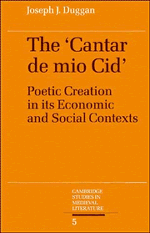Book contents
- Frontmatter
- Dedication
- Contents
- Acknowledgments
- Modern equivalents to names in the maps
- Maps
- 1 Historical and theoretical framework
- 2 The acquisition of wealth
- 3 Economy and gift-giving
- 4 Social status, legitimacy, and inherited worth
- 5 The poet's milieu
- 6 Geography and history
- 7 The Cantar de mio Cid and the French epic tradition
- 8 Mode of composition
- 9 Conclusion
- Notes
- List of references
- Index
1 - Historical and theoretical framework
Published online by Cambridge University Press: 05 August 2014
- Frontmatter
- Dedication
- Contents
- Acknowledgments
- Modern equivalents to names in the maps
- Maps
- 1 Historical and theoretical framework
- 2 The acquisition of wealth
- 3 Economy and gift-giving
- 4 Social status, legitimacy, and inherited worth
- 5 The poet's milieu
- 6 Geography and history
- 7 The Cantar de mio Cid and the French epic tradition
- 8 Mode of composition
- 9 Conclusion
- Notes
- List of references
- Index
Summary
When one approaches a literary text, the experience is accompanied by a set of expectations about its nature that typically concern its aesthetic and moral qualities, its entertainment value, the functions and characteristics associated with genres, its usefulness, and perhaps, on a more sophisticated level, preconceptions about its situation in history and within the general framework of a literary tradition. Readers coming upon the same text will read it differently according to what they expect of it. Likewise, those encountering the same pieces of extratextual information relevant to their reading may interpret them variously according to their model of the text's functions – a model that is in turn the product of their anticipations.
As reading proceeds, the expectations evolve: new information leads to an adjustment in the model. Even in the case of a text that one has read many times, it is not unusual to find aspects that take hold in one's consciousness for the first time, impress us unexpectedly with their importance, charm or intrigue or disgust us in new ways, strike a chord with notes with which they could not harmonize before because the instrument had not been tuned for them, as the effects of experience, with the consequent appropriation of new ideas and perhaps even new affective states, allow us to respond to its richness in previously unattainable ways.
- Type
- Chapter
- Information
- The Cantar de mio CidPoetic Creation in its Economic and Social Contexts, pp. 1 - 15Publisher: Cambridge University PressPrint publication year: 1989



